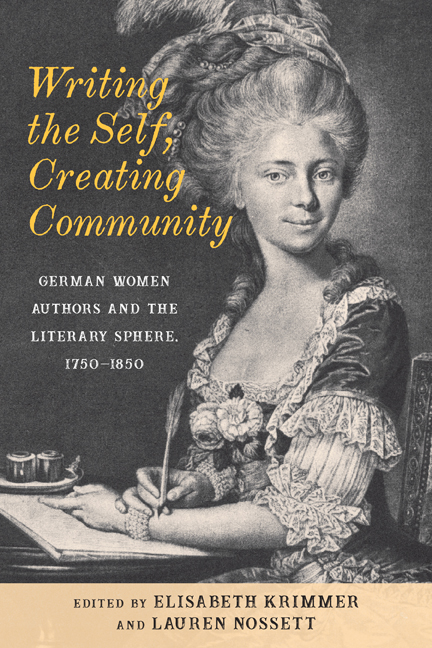Book contents
- Frontmatter
- Contents
- Acknowledgments
- Introduction
- Part I Writing a Community
- 1 Empowering Germany’s Daughters: On the Pedagogical Program and the Poetic Techniques of Sophie von La Roche
- 2 “Ich spreche lieber von guten Büchern”: Sophie von La Roche’s Concept of Female Authorship and Readership
- 3 Challenging Female Ideals: Marie-Elisabeth de La Fite’s Translation of Sophie von La Roche’s Geschichte des Fräuleins von Sternheim
- 4 Catherine II, Polyxene Büsching, and Johanna Charlotte Unzer: A Literary “Community of Practice”
- Part II Writing the Self
- 5 Ghostwriters: The Apparitional Author in Benedikte Naubert’s “Die Weiße Frau” (1792) and Sophie Albrecht’s Das Höfliche Gespenst (1797)
- 6 Vampirism Inverted: Pathology, Gender, and Authorship in Karoline von Günderrode’s “Die Bande der Liebe”
- 7 Wozu eine Amazonen—Literatur? Literary Creativity and Productivity in the Writings of Helmina von Chézy
- 8 Women Writers and the Märchenoma: Foremother, Identity, and Legacy
- Part III Writing toward Emancipation
- 9 The Illegitimacy of Authorship and the Legitimization of Passion in Agnes von Lilien
- 10 The Politics of the Female Body in Louise Aston’s and Fanny Lewald’s Writings through the Prism of the Romantic Theory of Sociability and Dialogue
- 11 Weibliche Irrsterne: Louise Otto and the Notion of Female Genius in Nineteenth-Century Germany
- Bibliography
- Notes on the Contributors
- Index
4 - Catherine II, Polyxene Büsching, and Johanna Charlotte Unzer: A Literary “Community of Practice”
Published online by Cambridge University Press: 01 October 2020
- Frontmatter
- Contents
- Acknowledgments
- Introduction
- Part I Writing a Community
- 1 Empowering Germany’s Daughters: On the Pedagogical Program and the Poetic Techniques of Sophie von La Roche
- 2 “Ich spreche lieber von guten Büchern”: Sophie von La Roche’s Concept of Female Authorship and Readership
- 3 Challenging Female Ideals: Marie-Elisabeth de La Fite’s Translation of Sophie von La Roche’s Geschichte des Fräuleins von Sternheim
- 4 Catherine II, Polyxene Büsching, and Johanna Charlotte Unzer: A Literary “Community of Practice”
- Part II Writing the Self
- 5 Ghostwriters: The Apparitional Author in Benedikte Naubert’s “Die Weiße Frau” (1792) and Sophie Albrecht’s Das Höfliche Gespenst (1797)
- 6 Vampirism Inverted: Pathology, Gender, and Authorship in Karoline von Günderrode’s “Die Bande der Liebe”
- 7 Wozu eine Amazonen—Literatur? Literary Creativity and Productivity in the Writings of Helmina von Chézy
- 8 Women Writers and the Märchenoma: Foremother, Identity, and Legacy
- Part III Writing toward Emancipation
- 9 The Illegitimacy of Authorship and the Legitimization of Passion in Agnes von Lilien
- 10 The Politics of the Female Body in Louise Aston’s and Fanny Lewald’s Writings through the Prism of the Romantic Theory of Sociability and Dialogue
- 11 Weibliche Irrsterne: Louise Otto and the Notion of Female Genius in Nineteenth-Century Germany
- Bibliography
- Notes on the Contributors
- Index
Summary
IN EARLY SUMMER OF 1764, Catherine II, the reigning czarina of the Russian empire, began to seek the companionship and literary assistance of a middle-class German woman who lived nearby. The empress wanted knowledgeable feedback on a handful of texts she had composed and so entered into an informal partnership with the author of two books of poetry, Polyxene Christiane Auguste Büsching, née Dilthey (1728– 77), and through her with another published writer, Johanna Charlotte Unzer (1725–82). Together, I argue, the three became a tenuous collective of women supporting each other in their writing. To analyze their interaction, I am applying two related social science models, one of social networks and the other of communities of practice. Social network analysis treats network participants as “interdependent rather than independent” actors, sees the linkages among them as “channel[ing] information, affection and other resources,” and assumes that “the structures of … ties among actors both constrain and facilitate action.” Of various available accounts of a “community of practice,” the one most helpful for literary-historical purposes describes a group of individuals with a shared attachment to a craft or field of expertise, who, in pursuing their craft or knowledge, “engage in joint activities and discussions, help each other, … build relationships,” and are themselves practitioners, not passive observers. By considering the three writers as a very small social network, and specifically as a “community of practice,” it is possible to discern certain less recognized elements of what enabled German women in the eighteenth century to become and remain writers, as well as what constrained them.
It is the emphasis on practitioners that distinguishes the “community of practice” from a “literary group,” such as the one composed of geographically dispersed readers who were united by their responses to Sophie von La Roche's monthly journal Pomona (1783–84). Paying attention to literary groups, I have argued elsewhere, enables us to identify and name certain loosely organized communities that persisted through time and across distance and provided their members, mostly women in the Pomona instance, “at least a small degree of reciprocal communication,” thus nurturing both readers and writers.
- Type
- Chapter
- Information
- Writing the Self, Creating CommunityGerman Women Authors and the Literary Sphere, 1750–1850, pp. 86 - 114Publisher: Boydell & BrewerPrint publication year: 2020



